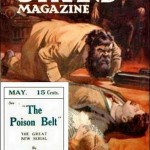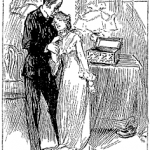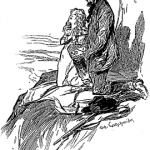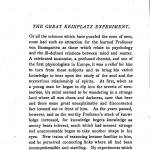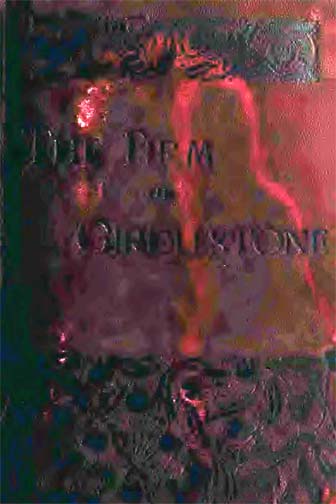
Never in the whole history of Morrison’s boarding establishment had such festive preparations been known. The landlady herself had entered heart and soul into the business, and as all the boarders had received invitations for themselves and their friends, they co-operated in every possible manner to make the evening a success. The large drawing-room had been cleared and the floor waxed. This process left it in a very glassy and orthodox condition, as the cook discovered when, on bustling in, the back of her cranium came in violent contact with the boards, while her body described a half-circle with a velocity which completely eclipsed any subsequent feats of agility shown by the dancers in the evening. The saloon had been very tastefully laid out as a supper-room, and numerous other little chambers were thrown open and brightened up to serve as lounging places for those who were fatigued. In the parlour there were two card-tables, and every other convenience for any who preferred sedentary amusements. Altogether both Mrs. Morrison and the boarders, in solemn conclave assembled, agreed that the thing looked very promising, and that it would be a credit to the establishment.
The guests were as varied as the wines, though hardly as select. Mrs. Scully’s exuberant hospitality included, as already intimated, not only her own friends, but those of her fellow-boarders, so that from an early hour the rooms began to fill, and by nine o’clock there was hardly space for the dancers. Hansoms and growlers rattled up in a continuous stream and discharged their burdens. There was a carpet down from the kerb to the head of the lodging-house steps, “like r’yalty,” as the cook expressed it, and the greengrocer’s man in the hall looked so pompous and inflated in his gorgeous attire that his own cabbages would hardly have recognized him. His main defect as a footman was that he was somewhat hard of hearing, and had a marvellous faculty of misinterpreting whatever was said to him, which occasionally led to remarkable results. Thus, when he announced the sporting Captain Livingstone Tuck under the title of Captain Lives-on-his luck, it was felt that he was rather too near the truth to be pleasant. Indeed, the company had hardly recovered from the confusion produced by this small incident when the two Bohemians made their appearance.
Mrs. Scully, who was tastefully arrayed in black satin and lace, stood near the door of the drawing-room, and looked very charming and captivating as she fulfilled her duties as hostess. So thought the major as he approached her and shook her hand, with some well turned compliment upon his lips.
“Let me inthroduce me friend, Herr von Baumser,” he added.
Mrs. Scully smiled upon the German in a way that won his Teutonic heart. “You will find programmes over there,” she explained. “I think the first is a round dance. No, thank you, major; I shall stand out, or there will be no one to receive the people.” She hurried away to greet a party of new arrivals, while the major and Baumser wandered off in search of partners.
There was no want of spirit or of variety in the dancing at Morrison’s. From Mr. Snodder, the exciseman, who danced the original old-fashioned trois-temps, to young Bucklebury, of the Bank, who stationed himself immediately underneath the central chandelier, and spun rapidly round with his partner upon his own axis, like a couple of beetles impaled upon a single pin, every possible variation of the art of waltzing was to be observed. There was Mr. Smith, of the Medical College, rotating round with Miss Clara Timms, their faces wearing that pained and anxious expression which the British countenance naturally assumes when dancing, giving the impression that the legs have suddenly burst forth in a festive mood, and have dragged the rest of the body into it very much against its will. There was the major too, who had succeeded in obtaining Mrs. Scully as a partner, and was dancing as old soldiers can dance, threading his way through the crowded room with the ease begotten by the experience of a lifetime. Meanwhile Von Baumser, at the other end, was floundering about with a broad smile upon his face and an elderly lady tucked under his right arm, while he held her disengaged hand straight out at right angles, as if she had been a banjo. In short, the fun was fast and furious, and waltz followed polka and mazurka followed waltz with a rapidity which weeded out the weaker vessels among the dancers and tested the stamina of the musicians.
Then there was the card-room, whither the Widow Scully and the major and many others of the elders repaired when they found the pace too fast for them. Very snug and comfortable it was, with its square tables, each with a fringe of chairs, and the clean shining cards spread out over their green baize surfaces. The major and his hostess played against Captain Livingstone Tuck and an old gentleman who came from Lambeth, with the result that the gallant captain and his partner rose up poorer and sadder men, which was rather a blow to the former, who reckoned upon clearing a little on such occasions, and had not expected to find himself opposed by such a past master of the art as the major. Then the veteran and another played the hostess and another lady, and the cunning old dog managed to lose in such a natural manner, and to pay up with such a good grace, and with so many pretty speeches and compliments, that the widow’s partner was visibly impressed, a fact which, curiously enough, seemed to be anything but agreeable to the widow. After that they all filed off to supper, where they found the dancers already in possession, and there was much crushing and crowding, which tended to do away with ceremony and to promote the harmony of the evening.
If the major had contrived to win favour from Mrs. Lavinia Scully in the early part of the evening, he managed now to increase any advantage he had gained. In the first place he inquired in a very loud voice of Captain Tuck, at the other end of the table, whether that gentleman had ever met the deceased Major-General Scully, and being answered in the negative, he descanted fluently upon the merits of that imaginary warrior. After this unscrupulous manoeuvre the major proceeded to do justice to the wine and to indulge in sporting reminiscences, and military reminiscences, and travelling reminiscences, and social reminiscences, all of which he treated in a manner which called forth the admiration of his audience. Then, when supper had at last been finished, and the last cork drawn and the last glass filled, the dancers went back to their dance and the card-players to their cards, and the major addressed himself more assiduously than ever to the pursuit of the widow.
“I am afraid that you find the rooms very hot, major,” she remarked.
“They are rather hot,” he answered candidly.
“There is a room here,” she said, “where you might be cooler. You might have a cigarette, too. I meant these rooms as smoking-rooms.”
“Then you must come, too.”
“No, no, major. You must remember that I am the hostess.”
“But there is no one to entertain. They are all entertaining each other. You are too unselfish.”


